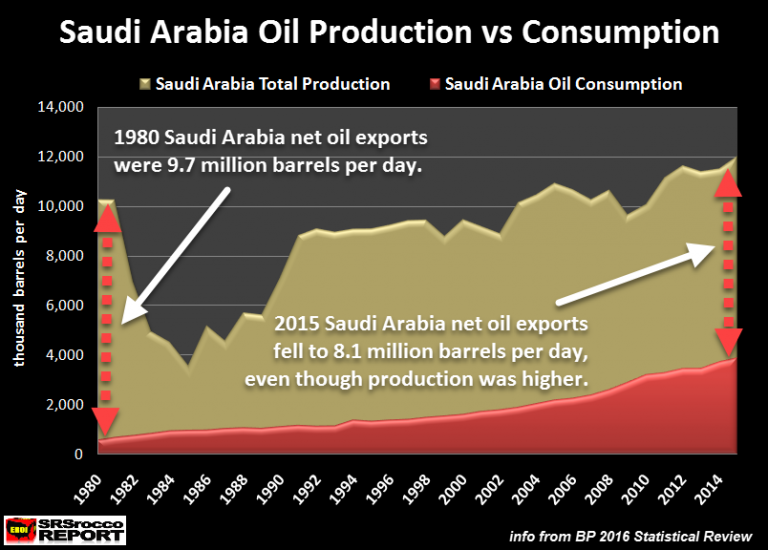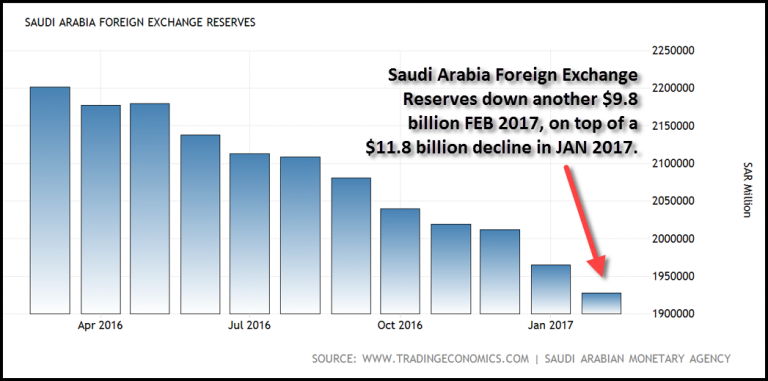The Middle East’s largest oil producer is in serious trouble as it continues to burn through cash. Not only is Saudi Arabia burning through its foreign exchange reserves at a rapid pace, its future net oil exports will continue to decline. Why? Because Saudi Arabia is using more of its own oil and that is a BIG PROBLEM.
Matter of fact, Saudi Arabia’s net oil exports were higher in 1980 than they were in 2015. According to the 2016 BP (LON:BP) Statistical Review, Saudi Arabia produced a total of 10.2 million barrels a day (mbd) of petroleum liquids, while its domestic consumption was only 592,000 barrels per day (bd). Thus, Saudi’s net oil exports were 9.7 mbd in 1980:

Even though Saudi Arabia’s total petroleum liquid production increased to 12 mbd in 2015, their domestic oil consumption jumped to 3.9 mbd. Which means, the Saudi’s net oil exports are only 8.1 mbd, lower than what they were in 1980.
This is a very important factor not discussed by the energy analysts. While it is true that the Middle East is producing more oil than ever, they are also consuming a great deal more oil for their domestic economies. For example, total Middle East net exports were 20.8 mbd in 1976, however they fell to 20.4 mbd in 2015.
The increase in Saudi Arabia’s domestic oil consumption will continue to put a squeeze on its oil exports in the future. In just ten years, Saudi Arabia’s domestic oil consumption has grown by 1.7 million barrels per day. Once, the Kingdom’s oil production really starts to decline, their net exports will fall considerably. This will make their financial situation go from BAD to WORSE.
As I mentioned in my article, Low Oil Prices Continue To Decimate Saudi Arabia’s Currency Reserves, the Kingdom’s foreign exchange reserves fell 32% in just the past two and a half years. Well, according to the Trading Economics data, the Saudi’s liquidated another $9.8 billion of their foreign currency reserves in February:

Because the Saudi’s continue to liquidate their foreign exchange reserves (mostly U.S. Treasuries), then the price they are getting paid for their oil isn’t high enough to support their national government. This is bad news, and it will only get worse when the broader stock markets finally start to crack.
The only option the Fed and Central Banks have remaining is all out hyperinflation. Now, this could buy the Saudi’s some time as the oil price would surge higher, but we must remember, hyperinflation events don’t last that long, a few years at the most.
A perfect example of this is currently taking place in Venezuela. It is certainly ironic that the country with the largest oil reserves in the world is completely falling apart. Why is that? Some point to the corrupt and inefficient government that is running their national oil industry. That sounds reasonable at face value, but another important factor is that a large percentage of Venezuela’s heavy oil reserves are likely not commercially viable.
Regardless, Saudi Arabia is in serious trouble as it continues to burn through its cash while its net oil exports will trend lower in the future. When Saudi Arabia’s oil production peaks for good, it will be the end of an era for once mighty Kingdom.
